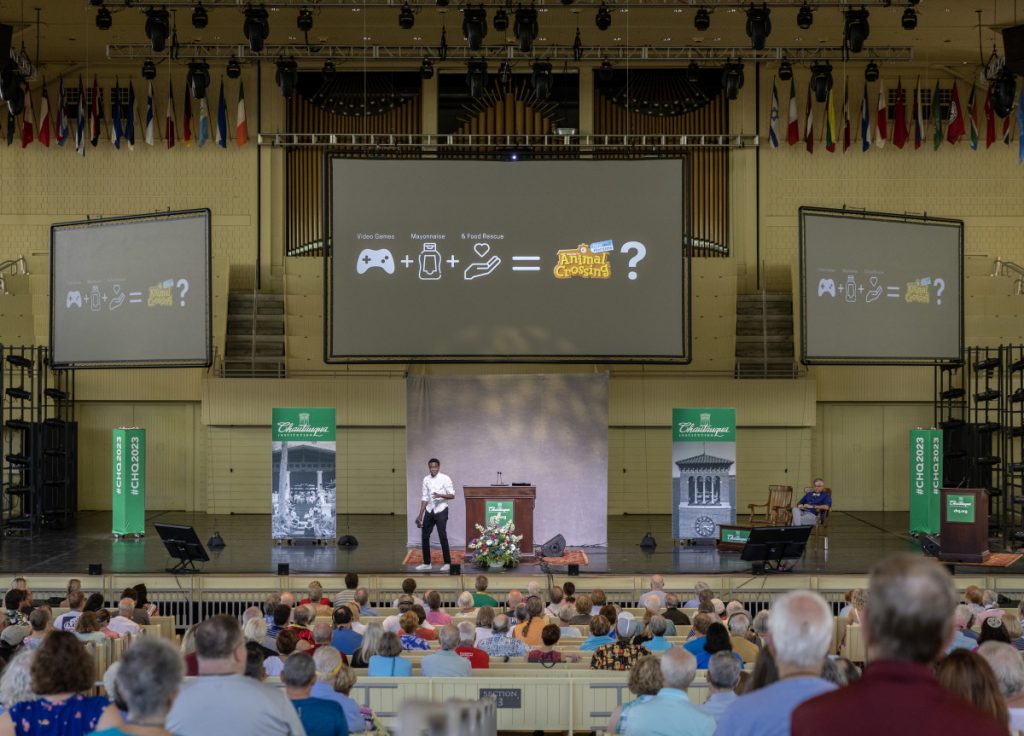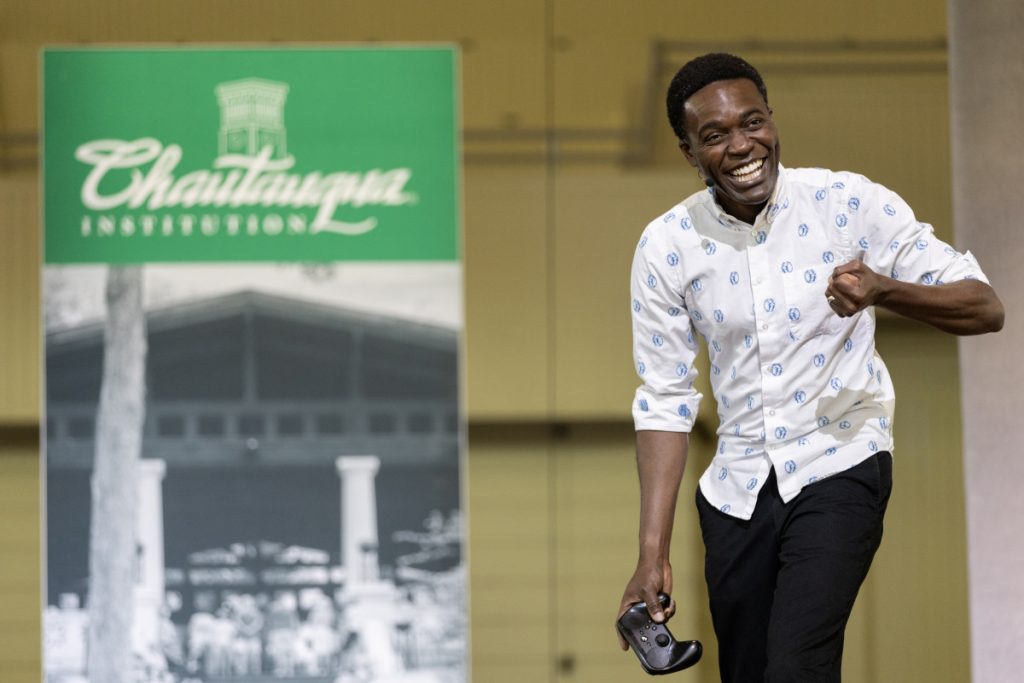
Alton Northup
Staff Writer
Kristopher Alexander might be the first speaker at Chautauqua Institution to present his lecture slides using a video game controller.
Alexander is a two-time globally ranked player and assistant professor of media production in the RTA School of Media at Toronto Metropolitan University, where he is the director of the Red Bull Gaming Hub. He gave his lecture, “Impactful Synergy: Video Games and Togetherness,” at 10:45 a.m. Wednesday in the Amphitheater to continue the Chautauqua Lecture Series Week Two theme, “Games: A Celebration of Our Most Human Pastime.”
In 2008, Alexander had his hands full.
He was teaching stop motion animation – the art of photographing and moving objects in small increments so that they appear to be moving independently when the frames are played back – at the National Film Board of Canada. The work was tedious; it takes 24 photos for just a single second of footage.
“Just like parenting,” he said, “animation takes a lot of patience.”
He was also teaching video game development – the art of creating a story others can interact with – at the University of Toronto, where students ranged from ages 6 to 16 years old.
His third job, which he continues to this day, was at Toronto Metropolitan University teaching video game design – the art of curriculum development for a gaming story, such as deciding what characters can talk, how they will talk and when they will talk.
“They call me the professor of video games because I teach and reach people by talking about the artistry of the video game industry and how every single discipline, including yours, connects to the video game industry,” he said.
Alexander had planned to make a lot of connections, or impactful synergies as he called it, during his lecture. The first was between video games, personal care and love.

In 2008, Alexander walked into EB Games, a division of GameStop, to purchase a copy of the open world racing game “Burnout Paradise.”
The game takes place in the fictional Paradise City, where players can compete in online matches, drive into oncoming traffic and burst through billboards – “all the things you’d like to do when you’re stuck in gridlock traffic, but can’t do.”
Alexander was also unsuccessfully looking for love in 2008, and when he turned to leave the store with his copy of the game, he heard the cashier calling back to him.
“Hold on a second,” the cashier said. “You just purchased ‘Burnout Paradise’?”
“You were there when I did it,” Alexander confusingly replied.
“I know that, but I’m supposed to give you this,” the cashier, responded, handing him a Gillette Pro razor.
Without giving much thought to the cashier’s slightly offensive gift, he went home to play the new game. After loading the disc, he quickly learned the razor was not the working of a petty cashier but rather a partnership between Gillette and the game developers; billboards for the company lined the streets of Paradise City and players could even drive a Gillette-branded van.
Alexander admits the razor was the key to finding the woman of his dreams, as his future wife would notice his clean-cut look.
Gillette, he suspects, must have discovered the game had a large enough audience of people who shave that it made sense to market the brand with “Burnout Paradise.”
“They had a community-focused connection,” he said.
The next impactful synergy was video games, mayonnaise and food rescue.
“Animal Crossing” is a popular social simulation video game series developed by Nintendo. The game uses the console’s internal clock to stimulate real passage of time as players log on each day to maintain their islands and hang out with friends.
Each Sunday, players log on to purchase turnips from a character named Daisy-Mae. The turnips aren’t there to be eaten; they’re actually the game’s version of the stock market – the Sow Joan’s Stalk Market.
The prices fluctuate during the week and because players cannot plant, eat or dispose of the turnips, they eventually rot if a sale is not made before the next Sunday. The game had a virtual food waste problem.
In 2020, Hellmann’s partnered with Nintendo for the creation of Hellmann’s Island. Players could explore the island, purchase digital merchandise and compost their spoiled turnips. For every turnip donated in the game, Hellman’s donated an actual meal to the Second Harvest Food bank.
“Why on earth did this magnificent collaboration happen?” Alexander rhetorically asked. “Video games, mayonnaise and food rescue. The answer is, this partnership happened in 2020, and I know what I was doing in 2020, but I also know what you were doing in 2020.”
“Animal Crossing” sold 31.18 million copies in 2020 alone and with the pandemic forcing people into their homes, video gameplay was up 75%, according to Verizon.
Hellmann’s easily reached its goal to provide 25,000 meals.
“That’s an incredible impactful synergy that extends beyond the playing,” Alexander said.
The third impactful synergy was between esports, luxury fashion and learning.
In 2022, Gucci partnered with FACEIT, an esports platform, to launch the Gucci Gaming Academy. The program provides selected esports athletes with full-time coaches, mental health support, gaming hardware and education.
Esports is the organized, high-level competition between individual video game players or teams. In recent years, it has become a lucrative business.
Competitions for CS:GO, a combat simulator, racked up more than 2.1 million views in 2020; sponsorships totaled more than $15.6 million, Alexander said.
“Why on earth would Gucci make a school?” he asked. “It’s because they could see something.”
The final impactful synergy is a finger-licking good combination of games and fried chicken.
In 2017, KFC released its first video game, a virtual reality training module called “The Hard Way.” Modeled after an escape room, the game’s trailer features the ominous gaze of Colonel Sanders as floating arms work frantically in a dimly lit kitchen.
In 2018, the company started a video-game-themed account on social media and the release of its second game, “I Love You Colonel Sanders: A Finger-Licking Good Dating Simulator,” followed in 2019. In the dating simulator, players attempt to develop a romantic relationship with Colonel Sanders, portrayed as an attractive culinary student.
In 2020, the company jokingly unveiled its very own KFConsole. The video game console was marketed with the tagline “Power Your Hunger” and a built-in “chicken chamber” to keep meals warm during gameplay.
Reactions to the bit were overwhelmingly positive. A prototype was even created with the help of Cooler Master, a computer supply company; Asus, an electronics manufacturer; and Seagate, a data storage company.
Alexander approached KFC to volunteer as the first to play the console, a deal he is still working on. As Chautauquans humored his passion for the company’s foray into gaming, they could not help but ask why.
“KFC has figured out that gamers eat,” he said.
Alexander said he wants to challenge the negative stereotypes of video games. With 3 billion players worldwide, not every game can appeal to everyone. But they can connect people in community-focused ways, such as turning digital turnips into real-world meals.
“We talk about games as a pastime,” he said. “I implore you to think about games as a present time.”




